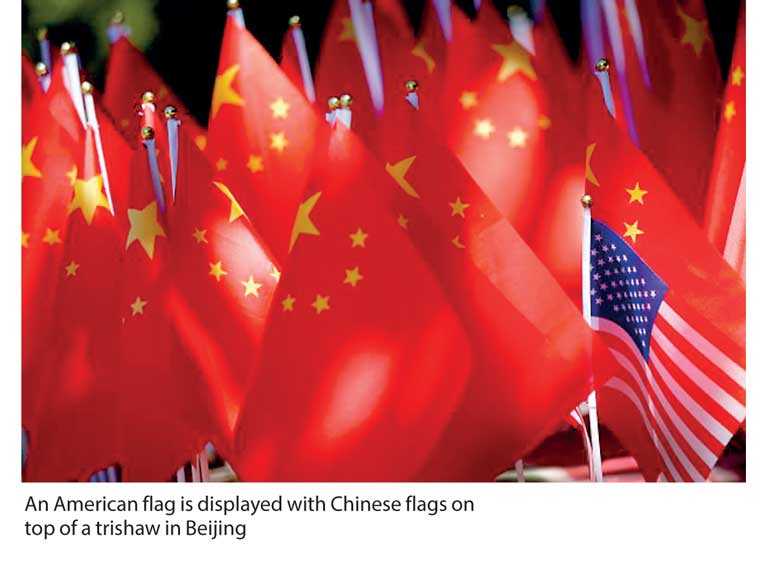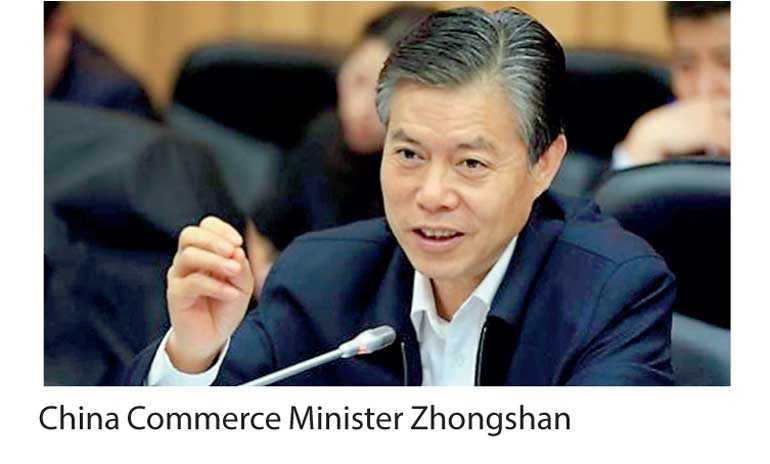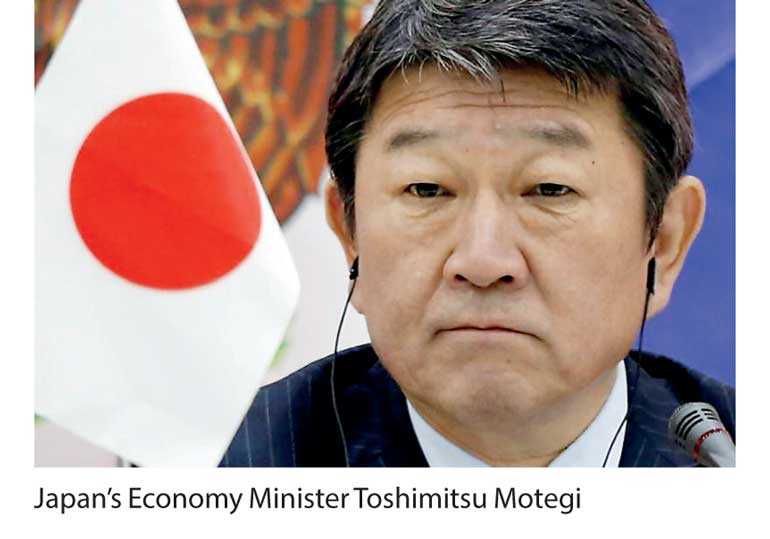Wednesday Feb 18, 2026
Wednesday Feb 18, 2026
Wednesday, 19 September 2018 00:00 - - {{hitsCtrl.values.hits}}


 WASHINGTON (Reuters): US President Donald Trump escalated his trade war with China on Monday, imposing 10 percent tariffs on about $200 billion worth of Chinese imports, but sparing smart watches from Apple and Fitbit and other consumer products such as bicycle helmets and baby car seats.
WASHINGTON (Reuters): US President Donald Trump escalated his trade war with China on Monday, imposing 10 percent tariffs on about $200 billion worth of Chinese imports, but sparing smart watches from Apple and Fitbit and other consumer products such as bicycle helmets and baby car seats.
Trump, in a statement announcing the new round of tariffs, warned that if China takes retaliatory action against US farmers or industries, “we will immediately pursue phase three, which is tariffs on approximately $267 billion of additional imports.”
The iPhone was not among the ‘wide range’ of products that Apple told regulators would be hit by the $200 billion round of tariffs in a Sept. 5 comment letter to trade officials.
But if the Trump administration enacts a further round of tariffs on $267 billion in goods, engulfing all remaining US imports from China, the iPhone and its competitors would not likely be spared.
Collection of tariffs on the long-anticipated list will start Sept. 24 but the rate will increase to 25 percent by the end of 2018, allowing US companies some time to adjust their supply chains to alternate countries, a senior administration official said.
So far, the United States has imposed tariffs on $50 billion worth of Chinese products to pressure China to make sweeping changes to its trade, technology transfer and high-tech industrial subsidy policies. Beijing has retaliated.
The escalation of Trump’s tariffs on China comes after talks between the world’s two largest economies to resolve their trade differences produced no results. US Treasury Secretary Steven Mnuchin last week invited top Chinese officials to a new round of talks, but thus far nothing has been scheduled.
“We have been very clear about the type of changes that need to be made, and we have given China every opportunity to treat us more fairly,” Trump said in his statement. “But, so far, China has been unwilling to change its practices.”
Fang Xinghai, vice chairman of China’s securities regulator, told a forum in the Chinese port city of Tianjin on Tuesday that he hopes the two sides can sit down and talk, but added that the latest US move has “poisoned” the atmosphere for negotiations.
Chinese Vice Premier Liu He is set to convene a meeting in Beijing on Tuesday morning to discuss the government’s response to the US decision, Bloomberg News reported, citing a person briefed on the matter.
A senior Trump administration official told reporters that the United States was open to further talks with Beijing, but offered no immediate details on when any new meetings may occur.
“This is not an effort to constrain China, but this is an effort to work with China and say, ‘It’s time you address these unfair trade practices that we’ve identified that others have identified and that have harmed the entire trading system,’” the official said.
China has vowed to retaliate further against any new US tariffs, with state-run media arguing for an aggressive “counterattack.”
China’s yuan currency CNY=CFXS slipped 0.3 percent against the US dollar in Asian trade on Tuesday. It has weakened by about 6.0 percent since mid-June, offsetting the 10 percent tariff rate by a considerable margin.
Consumer tech trimmed
The US Trade Representative’s office eliminated 297 product categories from the proposed tariff list, along with some subsets of other categories, but administration officials said the total value of the revised list would still be “approximately $200 billion.”
A broad, $23 billion category of internet-connected devices will remain subject to tariffs, but some products, such as smart watches, Bluetooth devices, and other consumer-focused technology products were removed following a lengthy public vetting period during which more than 6,000 comments were received.
Also spared from the tariffs were Chinese inputs for US-produced chemicals used in manufacturing, textiles and agriculture.
Consumer safety products made in China, such as bicycle helmets sold by Vista Outdoor and baby car seats and playpens from Graco Inc also were taken off the list.
But the adjustments did little to appease technology and retail groups who argued that the tariffs would hit consumers hard.
“President Trump’s decision to impose an additional $200 billion is reckless and will create lasting harm to communities across the country,” said Dean Garfield, president of the Information Technology Industry Council, which represents major tech firms.
The Retail Industry Leaders Association pointed out that the new tariffs would still hit more than $1 billion worth of gas grills from China, $843 million worth of luggage and travel bags, $825 million worth of mattresses, and $1.9 billion worth of vacuum cleaners.
“Tariffs are a tax on American families, period,” said Hun Quach,” RILA’s vice president for international trade. “Consumers – not China – will bear the brunt of these tariffs and American farmers and ranchers will see the harmful effects of retaliation worsen.”
Republican Party US lawmakers urged the Trump administration to pursue negotiations with China to resolve trade differences, while applauding Trump’s tough stance on Chinese intellectual property and trade practices.
“The sooner President Xi and President Trump meet to craft a new trade path forward, the better,” said Representative Kevin Brady, chairman of the House Ways and Means Committee.
BEIJING (Reuters): China’s commerce minister told representatives of foreign firms on Monday that the United States’ unilateralism and protectionism will impact both US and China’s interests and hurt the global economy.
China Commerce Minister Zhongshan told six multinational companies there was no winner in a trade war and that cooperation was the only correct choice, according to a statement posted on the commerce ministry’s website on Tuesday.China will accelerate its opening up and create a better business environment for companies, Zhong was quoted as saying.
Representatives of foreign firms that met with the commerce minister, which included Samsung Electronics Co, Toyota Motor Corp, HSBC Holdings and the Cohen Group, said they will continue to expand investment and cooperation in China, the commerce ministry said.
TOKYO (Reuters): Japanese policymakers on Tuesday called for an early solution to the escalating US-China trade war and warned of the potential damage to global growth in the wake of President Donald Trump’s decision to slap new tariffs on China.
Asian shares fell on Tuesday after Trump said he will impose tariffs on an additional $200 billion worth of Chinese imports, in a sharp escalation of the trade conflict between the world’s two biggest economies.
“Tit-for-tat tariff retaliation benefits no country,” Japan’s Economy Minister Toshimitsu Motegi told reporters after a regular cabinet meeting.
Finance Minister Taro Aso said while global trade imbalances must be fixed to avoid another financial crisis, the United States and China must address the problem through dialogue instead of slapping retaliatory tariffs on each other.
“The world’s biggest and second largest economies must hold dialogue appropriately,” Aso told a briefing on Tuesday.“Declines in trade volume means contraction of their economies, and the impact on other countries will become large.”
Trade minister Hiroshige Seko also said Trump’s decision to impose new tariffs on China was “extremely regrettable” as it could hurt the global economy and could have unintended consequences on other economies.
He said the government would scrutinise how the trade spat could affect Japanese companies, which may see sales hit if global supply chains are disrupted.
“There are quite a few Japanese companies who ship parts to China, which are then assembled (as final goods) and exported to the United States,” Seko told a news conference.
The intensifying trade friction is among risks the Bank of Japan will scrutinise at its two-day rate meeting that ends on Wednesday.
While many Japanese policymakers do not see the trade woes as an immediate threat to the country’s economic recovery, they fret that the damage could be serious if Trump decides to raise tariffs on automobile and auto parts imports.
Some policymakers also worry that Japan may come under pressure from Trump to open up its sensitive agriculture market through a bilateral free trade agreement.
Prime Minister Shinzo Abe and Trump are scheduled to meet for a summit on the sidelines of a UN General Assembly General Debate starting Sept. 25. Motegi and US Trade Representative Robert Lighthizer will likely hold a second round of trade talks ahead of the summit.
Motegi told reporters that he would likely make an announcement shortly on when the trade talks will be held.